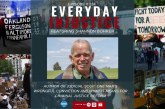

By David M. Greenwald
Executive Editor
It’s interesting the parallels in life. This weekend I wrapped up a quick read of the book, What We Knew, which chronicled first hand accounts from Nazi Germany told by Jewish and non-Jewish survivors of the Holocaust.
From the perspective of historians, one of the most important questions is what did the German people know and when did they know it.
Here we are, approaching 80 years since the end of World War II and most of the people from that period are long gone, or were very young at the time, and yet, we still don’t have a definitive answer.
A few years ago someone suggested that instead of watching TV during your downtime, read books. So, this year, I will have read over 120 books. I make it a point to read every book I can get my hands on with respect to criminal justice reform. But I have an ongoing project—I read books on atrocities.
Those who do not learn from history… Or as I like to put it, as the memory of human horrors fades into the oblivion of history, I am bearing witness for future generations. The danger of course is that if we start to forget something as well covered as the Holocaust, what hope do we have to remember the lesser known and  understood horrors of human history?
understood horrors of human history?
But it’s more than that, this year we are again reminded that books are inherently dangerous. This of course gets me into the current debate.
The last few weeks, people have been calling out the book Flamer —and I tip my cap to Trustee Joe DiNunzio who probably didn’t realize he was putting his neck on the line sharing his love for that book.
The controversy I think is misplaced and probably done by people who have not read the entire book but rather have seen what appears to be offensive graphics and passages—that are of course lifted out of context.
To see someone call the book “sexually explicit” “erotic” and “pornographic” —I don’t think those people understand the definitions of those words.
This reminds me of a school district in Tennessee banning the book Maus.
This one hit pretty close to home.
I am going to tell a pretty personal story here. In 1990, before my senior year in high school, I attended school in Israel. It was a pretty interesting time, because it was right in the middle of Intifada and it was an eye opening experience for someone from a small upper middle class college town in California.
But what threw me the most, was the course I took on Jewish history and the holocaust. The abandonment of the Jews. The fact that the west would not raise their immigration quotas to accept more Jewish. The idea that the US turned away ships full of Jews, condemning them to annihilation.
To this day, I am convinced beyond any doubt that my politics were shaped by this experience.
I won’t go into a lot of details, but I had to leave the program early and get some treatment for my depression. One of things my counselor had me read was Maus—which must have just come out at the that time, because Art Spiegelman won the Pulitzer Prize in 1992.
If you haven’t read it, the book tells the story of his parents living in 1940s Poland and him interviewing his father about his experiences as a Holocaust survivor. It’s told in cartoon form.
But yes, it’s a graphic novel and it’s about the Holocaust. It doesn’t censor things, like the fact that there is in fact “inappropriate language” and an illustration of a nude woman.
Newsflash—when people were deported to the concentration and extermination camps, they were stripped of their clothing.
Guess what, if you watch the movie Schindler’s List, you will hear horrible language and see nudity.
My mother used to tell me if people had to experience these horrors, the least we can do is watch this stuff.
Should children read Maus? I certainly think someone in middle school or high school should.
If you don’t want your kid to read such things, I think an opt out policy is alright, just as you can opt your kids out of sex education.
We already have a problem in this country and this world—our younger generation doesn’t know about the Holocaust. That’s not just a small problem—it’s a potential calamity waiting to happen.
It’s not just the admonition about failure to learn history—it’s how dangerous it is to fail to recognition the depths of human atrocities.
There are two passages from Elie Wiesel’s Night that ring true for me.
Both of them come from the people of Hungary who doubt this can be happening. I believe this is at the end of 1943 or early 1944, so in the middle of the mass murder, people are incredulous.
“Can this be true? This is the twentieth century, not the Middle Ages. Who would allow such crimes to be committed? How could the world remain silent?”
And:
“Yes, we even doubted his resolve to exterminate us. Annihilate an entire people? Wipe out a population dispersed throughout so many nations? So many millions of people! By what means? In the middle of the twentieth century!”
The idea that Hitler could be perpetuating this in the middle of the 20th Century in Europe was preposterous—and yet it wasn’t and it happened.
My belief is firmly what our kids don’t know in the middle of the 21st Century can in fact kill them.
Books like Flamer are intended to shock and grab people’s attention but they also illuminate very real things that people are going through.
There is nothing “pornographic” or “erotic” about the book. It’s graphic because those things really do happen. Heck, they happened way back in the 80s when I was in high school and I’m sure they are happening far more often today.
Books are dangerous. But guess what, you can’t wrap your kids up in plastic bubble wrap and have them go through life. Real bad stuff lurks in the world and we have to learn about it in order to navigate this life.







Then why don’t you post some of the offensive graphics and passages from the book Flamer to your blog so your readers can see what’s in question? If it’s appropriate for children then it should be okay for your readers.
Do you think I should also post the nude graphics from Maus? By the same logic.
So are you saying some of the illustrations and quotations from ‘Flamer’ are too obscene and graphic for you to post them on your blog but yet somehow it’s appropriate for children to read at their school libraries?
This is the point people are making.
I asked whether you think I should post the graphics from Maus
I first asked why aren’t you posting the obscene graphics from ‘Flamer’?
Why do you continue to dodge?
I’ve answered Keith’s question multiple times. He wants me to pull certain graphics out of the context of the book and post them. He also has refused to read the book, so he is not in position to judge whether the graphics are appropriate or inappropriate.
So David, you’re basically admitting that ‘Flamer’ has graphics and quotations that are too obscene for you to post them to your blog. But you still think it’s appropriate for children to read at their school library.
You keep ignoring “context” which I is why I’ve repeatedly used the Maus example. If you should show a graphic out of context, then it looks worse than it is. If you put into the context of the book, it makes the point intended to be made. There are a whole host of graphics from Maus that if posted alone would not be appropriate. But when taken in context, tell the important story of the Holocaust. You don’t want to engage on that point.
Keith has become a broken record. I knew Keith couldn’t help himself, so I decided not to make the first comment on this webpage. Children have a tendency to find what some prudish adults consider to be obscene. Just think back to some boys looking at their father’s issues of Playboy back in the day. Boys and girls wanting to play doctor and patient is another parallel.
More disingenuous nonsense.
The *children*!!!! *pearl clutch*
The book is not aimed at “children,” but to junior high and high schoolers. That *is* an appropriate audience no matter how much conservatives howl about it.
But they’re going to keep framing it as “children” so they can keep up their side narrative about pedophiles and groomers that is eventually going to get someone (else) killed.
I swear reading that book is liking transporting myself back to high school.
I’m not a male, and I haven’t read the entire book. From the excerpts I have seen, though, it seems very relatable to that age group.
And in having worked with adolescents for over a decade in this community, this is 100% how boys (and some girls) talk.
It’s not “sexualizing” anyone and it’s not “grooming” anyone or trying to “turn” anyone gay (which is not a thing, though M4L claim the contrary) and it’s certainly not “pornography.”
Don is right. These people are not serious people. They are completely unreasonable and I would add “puritanical” and “authoritarian” as someone noted in a similar thread the other day.
I can tell you one thing, as someone who was bullied as a kid, I would have loved to have had this book back then. I would have made a big difference.
David, stop giving Keith a platform for his stupid nonsense. These are not reasonable people. He will derail this whole thread again. And again. And again. These are not reasonable people and you should not be giving them a platform.
So my free speech should be shut down even though I’m adhering to all of the Vanguard comment rules, right Don? Why Don, because you don’t agree with my views?
Agreed. He’s obsessively repeating the same comment over and over on every article, he won’t respond to anyone’s answers (not even yours), and he’s sh*tting up all your comment threads. He’s not adding anything, and if you won’t block him then you should probably at least just ignore him.
There is no such thing on 100% free speech on any private conservative and liberal online sites and platforms, even on places that Keith frequently comments on. The 1st Amendment only applies to government entities. Don only requested that David stop replying to Keith’s broken record comments.
Exactly.
There is no such thing as free speech here, btw, someone has to pay the bills. Just saying…
What does paying the bills and free speech have to do in common? Doesn’t the Vanguard exist mostly from donations? Since you run a blog I guess that you have the right to control what views are allowed and what isn’t even though the commenter is abiding by your published comment rules? Then it just comes down to deleting another’s views because you don’t like them or they don’t align with your’s. Is that how you want to run your blog?
If the bills don’t get paid, you don’t have a platform for your views. Someone pays for your speech. If it’s not you, it’s someone else.
But what does that have to do with posting comments that abide by your rules?
Why don’t you create your own site Keith, then you can do whatever you want? David and the Davis Vanguard don’t even need to give anyone a reason why their comments aren’t posted. It’s purely at their sole discretion. If you tried to sue the Vanguard, Keith will lose.
David, I was 7 years old when I watched images on TV of police officers beating black men dressed in suits and overcoats in Selma. My mother was outraged – moving between the phone in the kitchen and the TV room frantically calling friends to alert them of what was happening on TV. Later she and others would board a bus to travel to Alabama to help MLK Jr and others bring attention to their cause. As a 7 year old, my understanding was fairly basic – “hitting people was not OK.” My understanding grew and shifted as I read books. Books were helpful. People are worried about exposing Jr High kids to a few drawings of naked people, but are missing the point. The images and descriptions may be necessary for the story and acceptable in that context. Knowledge of atrocities, of sexuality, of gender, when learned from a book is not harmful for children. Banning them from learning will.
If the images and passages are appropriate for children, and yes someone who is 11 or 12 years old in 6th or 7th grade or junior high age are still considered children in my book, then post them here so Vanguard readers can see what’s being discussed and make their own determination.
I recently talked to a family member and discussed some of the graphics of what the book contained and she said no way does she want her 11 year old child having access to that book.
Do you know for a fact that this book is available in any Davis public school or in the Davis Public Library Keith? If not, this is not a Davis issue. Neither your anonymous family member or you have ever even bothered to look at the actual book in question. Your family member was exclusively going off of your highly biased and prudish description, not the actual book.
I think this scene is probably more representative of the book.
You do know David that those aren’t the illustrations or the obscene quotations that are the problem.
Did you not read the comment I posted?
I don’t think it matters what YOU think is representative of the book, it’s what’s the children actually have access to because believe me they will find it.
I think it does matter because I’ve been arguing from the start that you haven’t read the book and are taking the “objectionable” scenes out of context. I will add the point that most of the “objectionable” material will go over the heads of the children you are worrying about (or if it doesn’t, it means they’ve already been exposed to it). There is nothing in the book that I didn’t encounter in my own school by the time I was 14.
“The children.”
Just because *you* want to categorize adolescents as “children” doesn’t make it so.
It’s just another appeal to pathos. Reasonable people see right through it.
It wasn’t long ago that conservatives like Bill O’Reilly and Charlie Kirk were defending the second amendment by suggesting mass shootings were an unfortunate “price of freedom.” The 20 children killed at Sandy Hook, I suppose, could be considered martyrs for the Constitution. God bless them. Yet these same conservatives are willing to compromise our first amendment freedoms just in case a child stumbles across images of gay cartoon sex or a trans character in the young adult section of the public library. Sigh. It’s as if these pearl-clutching adults have never heard of the internet. Believe me, their kids are much savvier than their parents when it comes to finding the juicy bits online. This whole “controversy” is not about “protecting children.” It’s about scoring political points by demonizing already marginalized populations. As usual.
FYI: “Flamer” is available at the Davis Public Library and the Woodland Public Library. On the shelves (if not checked out) in the “teen fiction” section, I believe. FWIW, the reviews by well-known book review publications on the Yolo County/Davis Public Library online book catalogue are all highly favorable.